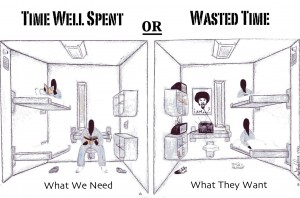Prison Education Reduces Recidivism…
According to a press release that I received yesterday:

“Jake Cronin, a policy analyst with the Institute of Public Policy in the Truman School of Public Affairs at the University of Missouri, studied Missouri Department of Corrections data and found that inmates who earned their GED in Missouri prisons were significantly more likely to find a job after prison and less likely to recidivate than inmates who did not. Cronin found the biggest jump in reduced recidivism rates, more than 33 percent, when he looked at inmates who earned a GED and acquired a full-time job after their release.
“Employment proves to be the strongest predictor of not returning to prison that we found,” Cronin said. “Those who have a full-time job are much less likely to return to prison than similar inmates who are unemployed. Recidivism rates were nearly cut in half for former inmates with a full-time job compared to similar inmates who are unemployed. Inmates who take advantage of the educational opportunities available to them in prison are more likely to find a job than those who do not.”
Cronin says these reduced recidivism rates can save the state a substantial amount of money in reduced incarceration costs. He points to a similar study which found that educational programs that reduced recidivism rates saved the state of Maryland $24 million a year, which is twice the amount of money spent on the program. Cronin believes this shows that correctional facility educational programs are a good investment for the state of Missouri.
“If similar results occur in Missouri, which I would expect given the findings of this study, that would mean the state is currently saving more than $20 million a year in reduced incarceration costs as a result of correctional education programs,” Cronin said. “In this political environment, states across the country are looking for ways to save money. This is one program that, in the long run, saves the state money. It is a good investment; an investment that has a high rate of return.”

This is directly relevant to current prisoners. My pen pal Randy Miller who is incarcerated at Indiana State Prison is an advocate for prisoner education. Here is a letter to the editor that he wrote a couple of months ago about this topic:
Recent legislation passed by Indiana law makers eliminated the bachelor’s degree program from all Indiana State Prison beginning in the fall semester of 2011. The reason given by Governor Mitch Daniels and the state legislators for this action, is that it is unfair for tax payers to be burdened with the cost of covering educational expenses for convicted felons. This may be a valid argument, except that financially it is an outright lie.
The cost of college expenses in the 2010 school year for all Department of Correction inmates was $9.06 million, covered by the Obama grant program. Under new legislation, only $2 million will be allocated to the Department of Corrections to cover educational expenses for college. On the surface this appears to be a financially sound move and looks to save tax payers $7 million a year, but let’s look at what it really costs.
The state of Indiana pays the Department of Corrections just under $58 per day, per inmate, or $21,170.00 per year. There are approximately 361 inmates eligible to receive a bachelor’s degree each year within the Department of Corrections. Obtaining a bachelor’s degree cuts two years off an inmates sentence, saving tax payers $42,340.00 per inmate. By eliminating this opportunity for an average of 361 inmates state wide per year, Governor Mitch Daniels and your state legislators have saved you the tax payer $7 million a year in educational expenses to inmates, and burdened you with $15,284,740.00 per year to house inmates who now cannot receive this time cut. These costs do not include the rising rate of recidivism bound to follow these cuts in education.
Governor Mitch Daniels wants to move to technical schooling to teach inmates a trade rather than a general education, even though these trades have been shown and proven to have little to no effect on lowering recidivism rates. As it stands today, the average recidivism rate in Indiana is at 63 percent. A bachelor’s degree cuts that rate to less than 8 percent! Under Governor Mitch Daniels, Indiana has led the nation in prison population growth, with a prison population increase of more than 6 percent per year. Even California, a state who’s prison population dwarfs Indiana’s in comparison, cut it’s prison population by almost 3 percent.
It is time to change the way we think about the Department of Corrections. It is unfeasible to think you can warehouse inmates and ignore the problem, especially when more that 95 percent of those inmates will be re-entering society someday. The single most beneficial tool we have to lower crime rates, reduce recidivism and ensure the success of inmates re-entering society is education. There is absolutely no benefit for anyone in cutting educational funding to prisoners and eliminating the bachelor’s degree opportunity to inmates.
By
Randy Miller #154124
Indiana State Prison
August 6, 2011
